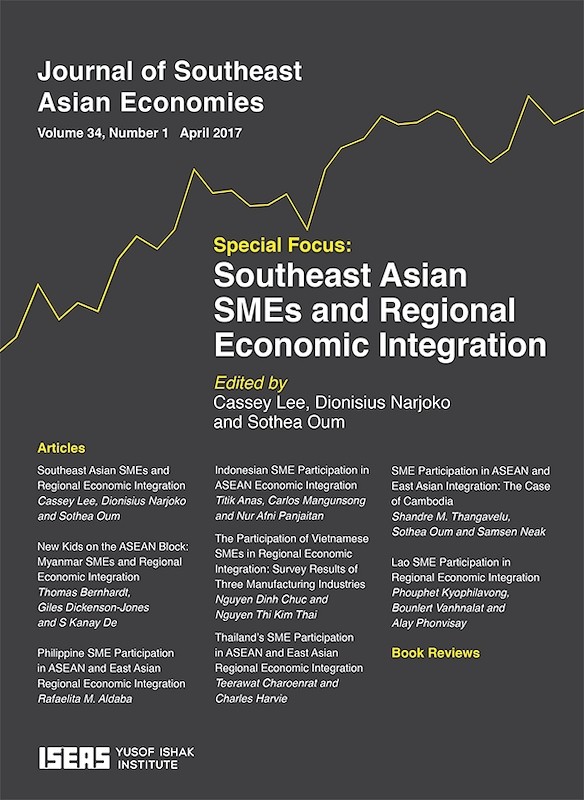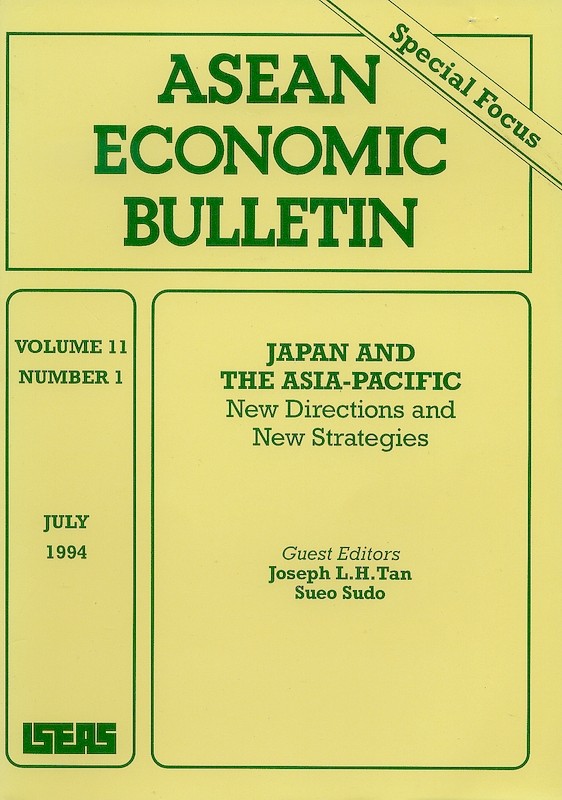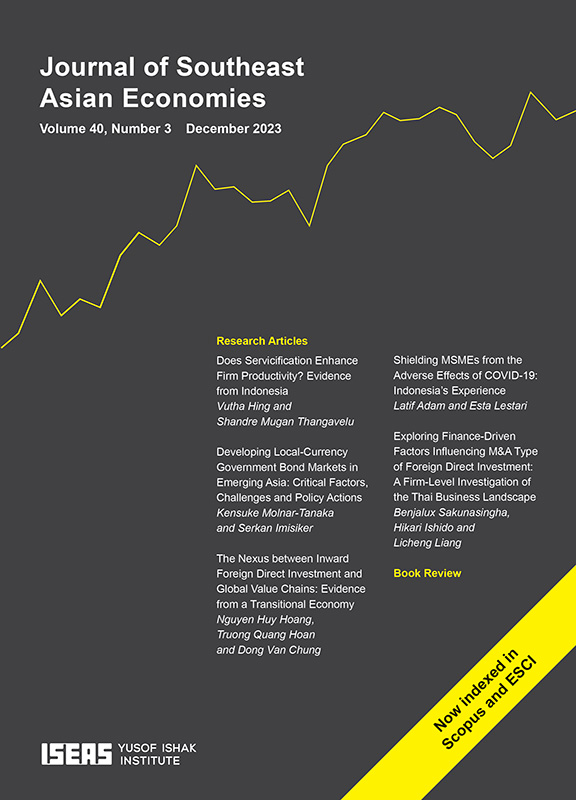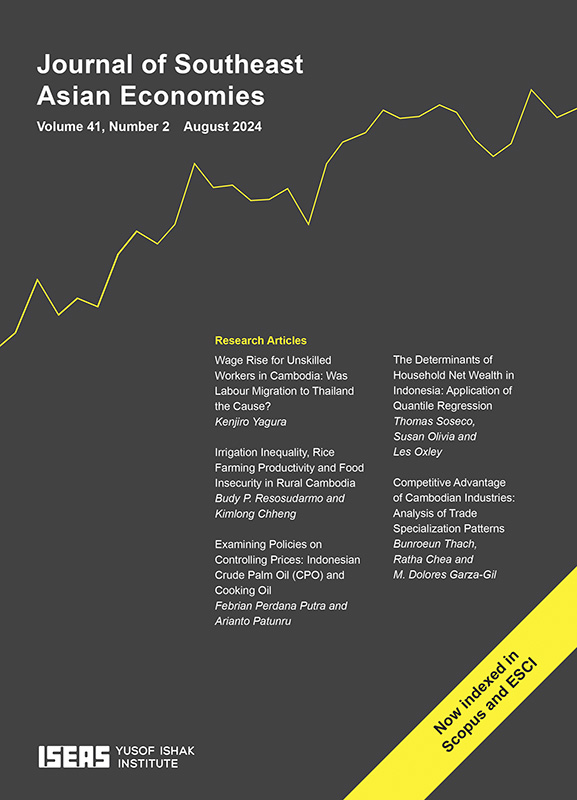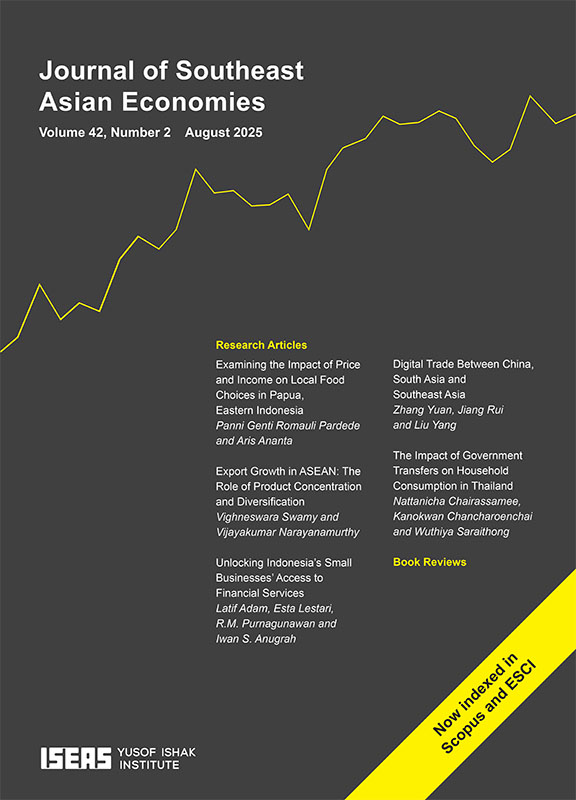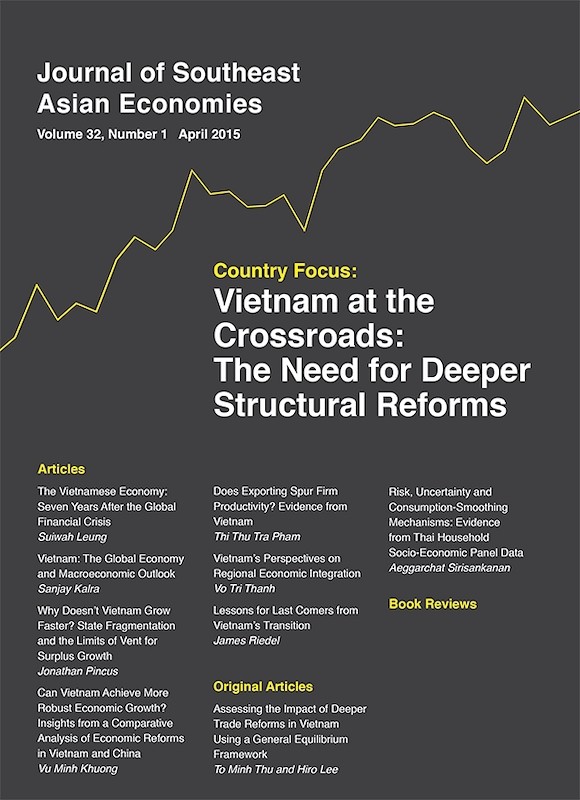Journal of Southeast Asian Economies Vol. 37/3 (December 2020)
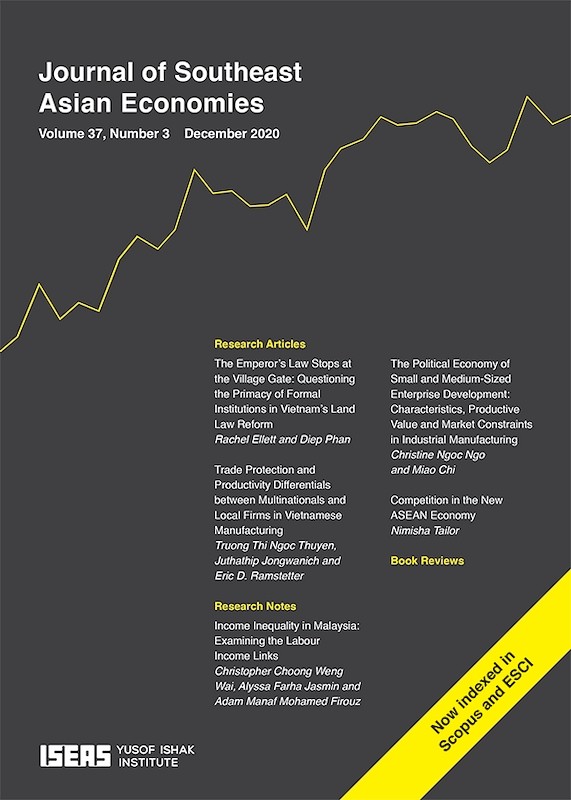
Date of publication:
December 2020
Publisher:
ISEAS – Yusof Ishak Institute
Number of pages:
100
Code:
AE37/3
About the publication
Contents
-
Journal of Southeast Asian Economies Vol. 37/3 (Dec 2020).
[Whole Publication, ISSN: 23395206] -
Preliminary pages
- RESEARCH ARTICLES
-
1. The Emperor’s Law Stops at the Village Gate: Questioning the Primacy of Formal Institutions in Vietnam’s Land Law Reform, by Rachel Ellett, Diep Phan, authors see abstractThis paper examines whether Vietnam’s experience in reforming its land law supports or contradicts the view that institutional change, in particular the formalization of institutions, is a prerequisite to successful economic growth. The paper explores the reasons for slow, incremental and partial land law reform and analyses the complex interaction between formal and informal institutions on land rights in Vietnam. Using the country as a case study, the paper argues that effective institutions are not preconditions for economic growth; rather institutions evolve alongside economic change in a non-linear, uneven process shaped by interactions between formal and informal institutions. The policy implication is that calls for “good governance” reform or for “strengthening the rule of law” are usually too broad be helpful or even realistic.
-
2. Trade Protection and Productivity Differentials between Multinationals and Local Firms in Vietnamese Manufacturing, by Truong Thi Ngoc Thuyen, Juthathip Jongwanich, Eric D Ramstetter, authors see abstractThis paper investigates the effects of trade protection and ownership on firm productivity in Vietnam between 2005 and 2010. In labour-intensive industries and industries with intermediate levels of trade protection, the impact of trade protection on firm productivity was negative and significant. Multinational enterprises (MNEs) and state-owned enterprises (SOEs) had higher productivity than indigenous private firms (IPFs), with productivity usually being the highest in joint ventures (JVs). Wholly-owned foreign MNEs (WOs) also had significantly higher productivity than IPFs in 2005–7, but these productivity differentials appear to have become insignificant in 2008–10. In capital-intensive industries, JVs had the highest productivity, but were followed by WOs, then SOEs and IPFs in the earlier period. Effective protection levels did not have a significant independent effect on firm productivity in capital-intensive industries.
- RESEARCH NOTES
-
3. Income Inequality in Malaysia: Examining the Labour Income Links, by Christopher Choong, Alyssa Farha Jasmin, Adam Manaf Mohamed Firouz, authors see abstractMalaysia’s long-term development plan Shared Prosperity Vision 2030 broadens the discourse on inequality by drawing attention to the labour income share as an indicator of the inequality between labour and capital owners. However, available evidence shows that anchoring inequality on a higher labour income share that is underpinned by broad-based growth in low value-added activities may be at odds with Malaysia’s ambitions of technological upgrading, moving towards higher productivity, and utilizing capital-intensive modes of production. Against this backdrop, this paper makes the argument that the missing piece in this narrative is the labour income dispersion. The effects of labour income on income inequality in Malaysia depend more on the labour income dispersion than the labour income share.
-
4. The Political Economy of Small and Medium-Sized Enterprise Development: Characteristics, Productive Value and Market Constraints in Industrial Manufacturing, by Christine Ngoc Ngo , Miao Chi, authors see abstractThis paper highlights the importance of small and medium-sized enterprise (SME) development and introduces the theoretical concept of productive value for qualitative analysis of firms. Vietnam’s industrial development experience is used as a case study. Although the Vietnamese government has channelled rents and business opportunities towards the state sector, the domestic private sector has been crucial to the country’s industrial development. Given this context, this study analyses how Vietnamese SMEs in the private sector generate productive value and overcome market failures that constrain their growth. Research findings demonstrate that most local SMEs in the industrial sectors rely on low pricing strategy to attract buyers. However, those that grow in size frequently go beyond price competition and concentrate on creating new productive value in their production and services. Furthermore, unlike SMEs in developed countries, in Vietnam, firm size is an indicator of productive value and strength. From this perspective, SME development policies in emerging economies must focus on promoting the growth of domestic firms over time.
-
Competition in the New ASEAN Economy, by Nimisha Tailor, author see abstractShifts in global trade, technological developments and the COVID-19 pandemic all provide an opportunity for Southeast Asia to grow its digital economy and accelerate economic recovery. Market dynamics are changing, with the rise of online platforms catering to the growing base of digitally literate consumers. Such platforms offer a wide choice of products and services at greater convenience, across borders and through different participants in the supply chain. Existing markets are becoming more competitive and new markets are being created as businesses benefit from digital technologies and draw insights from large volumes of available data. However, as the digital economy expands, sophisticated forms of anti-competitive behaviour are also emerging. Around the world, there are concerns that online platforms are becoming dominant and engaging in harmful conduct, such as collecting and using customer data—without consent—to exclude current and future competitors. Southeast Asia is vulnerable to these concerns, too. Using case studies, this study highlights why such concerns, if left unaddressed, pose a threat to competition in the “new” ASEAN economy.
- BOOK REVIEWS
-
BOOK REVIEW: Risk Management Competency Development in Banks: An Integrated Approach, by Eric H.Y. Koh., by Lutfey Siddiqi, author
-
BOOK REVIEW: Infrastructure Investment in Indonesia: A Focus on Ports, edited by Colin Duffield, Felix Kin Peng Hui, and Sally Wilson., by Siwage Dharma Negara, author

